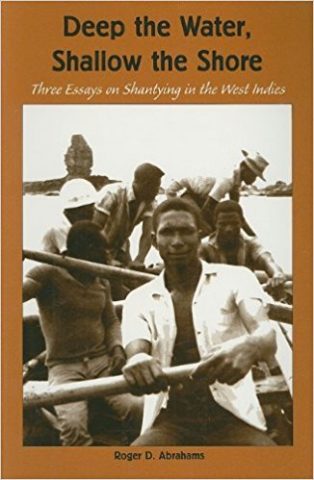 The shanty “Bear Away Yankee” (Deep The Water, Shallow The Shore) comes from the singing of West Indies sailors, collected by Alan Lomax and Roger D. Abrahams in the smaller Caribbean islands and published in “Deep The Water, Shallow The Shore “(1974). From the field recordings made in 1962 it was released “Caribbean Voyage: Nevis And St. Kitts” album
The shanty “Bear Away Yankee” (Deep The Water, Shallow The Shore) comes from the singing of West Indies sailors, collected by Alan Lomax and Roger D. Abrahams in the smaller Caribbean islands and published in “Deep The Water, Shallow The Shore “(1974). From the field recordings made in 1962 it was released “Caribbean Voyage: Nevis And St. Kitts” album
The chantey-singing fishermen, under the leadership of Walter Roberts or Reginald Syder performed songs used for boat hauling or while sailing, many reflecting past rather than contemporary practice. Notwithstanding, versions of several of the songs are also featured in Abrahams’ book about the tradition: Deep the Water, Shallow the Shore: Three Essays on Shantying in the West Indies, (Austin, University of Texas Press, 1974). (from here)
La shanty “Bear Away Yankee” (Deep The Water, Shallow The Shore) viene dai canti di lavoro nelle Indie Occidentali, collezionata da Alan Lomax e da Roger D. Abrahams nelle isole minori dei Caraibi e pubblicata nella raccolta “Deep The Water, Shallow The Shore” (1974).
Dalle registrazioni sul campo effettuate nel 1962 è stato realizzato l’album “Caribbean Voyage: Nevis And St. Kitts”
“I pescatori cantavano, sotto la guida di Walter Roberts o Reginald Syder, le canzoni usate per il trasporto di imbarcazioni o durante la navigazione, molte delle quali riflettevano il passato piuttosto che la pratica contemporanea. Nonostante ciò, le versioni di molte delle canzoni sono anche presenti nel libro di Abrahams sulla tradizione: Deep the Water, Shallow the Shore: tre saggi su Shantying nelle Indie occidentali, (Austin, University of Texas Press, 1974). (tradotto da qui)
A rowing chanty presumably dates back to 1831 when on a river trip in Guyana, a White British captain observed the enslaved Africans rowing his boat to sing “their favourite song: Velly well, yankee, velly well oh!“
Una rowing chanty che si presume risalga al 1831 quando,durante un viaggio fluviale in Guyana, un capitano britannico bianco osservò degli schiavi africani che remavano nella sua barca cantare “la loro canzone preferita: Velly well, yankee, velly well oh!!“
Roy Gumbs live Newcaste, isle of Nevis, 1962
Hulton Clint writes “The first is a recording that Alan Lomax made of Roy Gumbs and party of Newcastle, Nevis in July 1962. The second (starting 1:40) is a rendition presented by Roger Abrahams in _Deep the Water, Shallow the Shore_, from his fieldwork with fishermen in Nevis 1963-66. The textual themes are the same, but the melody noted by Abrahams is different than these men’s colleagues had sung a year or so earlier for Lomax.“
“La prima parte è la registrazione che Alan Lomax fece di Roy Gumbs e compagni di Newcastle, Nevis, nel luglio 1962. La seconda (a partire da 1:40) è la versione presentata da Roger Abrahams in “Deep Water, Shallow the Shore”, dal suo lavoro sul campo con pescatori a Nevis 1963-66. I temi testuali sono gli stessi, ma la melodia annotata da Abrahams è diversa da quella che i loro colleghi avevano cantato un anno prima per Lomax“
Hulton Clint Saint Vincent variant
This rendition was documented by Roger Abrahams in 1966, and the Vincentian group, The Barrouallie Whalers
He notes: Like many of these men’s songs, the lyrics have an element of taunting. Essentially, it critiques those who would not participate in the work of fishing but who would nevertheless expect to share in the spoils of that work.”
Questa interpretazione è stata documentata da Roger Abrahams nel 1966, e il gruppo vincenziano, The Barrouallie Whalers, Hulton Clint osserva: “Come molte di queste canzoni virili, i testi hanno un elemento di scherno. In sostanza, si critica coloro che pur non partecipando al lavoro di pesca, si aspettavano comunque di condividere il bottino di quel lavoro “.
Kenny Wollesen & The Himalayas Marching Band in Son Of Rogues Gallery ‘Pirate Ballads, Sea Songs & Chanteys ANTI 2013
Bear away (1) Yankee, bear away boy (repeat twice) Oh what we tell John Gould (2) today? Bear away Yankee, bear away boy Oh, deep the water an’ shallow the shore Bear away Yankee, bear away boy Bear away Yankee, bear away boy Bear away Yankee, bear away boy |
Traduzione italiana Cattia Salto Vento in poppa americano, vento in poppa ragazzo (ripete due volte) Che diciamo a John Gould oggi? Vento in poppa.. profondo il mare e fondale basso a riva Vento in poppa.. Vento in poppa.. Vento in poppa.. |
NOTE
Like many shanties, the lyrics vary from singer to singer, especially with these fairly simple examples. [Come molti chantey, i testi variano da cantante a cantante]
Pull away all through the day
Bear away to Noble Bay
1) Bear away è un termine nautico per poggiare (o puggiare)
2) John Gould is supposed to have been a shipowner who lost his cargo [John Gould potrebbe essere un armatore che ha perso il suo carico]
LINK
http://research.culturalequity.org/rc-b2/get-audio-ix.do?ix=recording&id=5936&idType=performerId&sortBy=abc
https://www.mustrad.org.uk/reviews/nevis.htm
http://neurosis02.gz01.bdysite.com/index.php/2019/01/13/caribbean-voyage-nevis-and-st-kitts/
http://thejovialcrew.com/?page_id=5180
http://www.tomlewis.net/lyrics/bear_away.htm
https://www.bethsnotesplus.com/2013/12/bear-away-yankee-bear-away-boy.html
